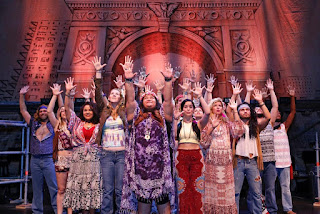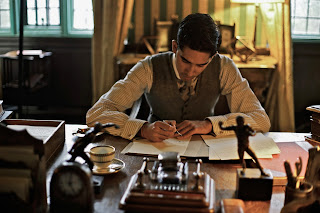“Alice Through the Looking Glass” a Messy Sequel
By Skip Sheffield
Curiouser and curiouser. That’s the polite way of describing
“Alice Through the Looking Glass.” “A Mess” is more to the point.
Poppycock and folderol are old-fashioned words that explain
the plot of “Alice.” The plot cost may $1.98 at a used book store for Lewis
Carroll’s 1871 “Through the Looking Glass.” The rest of the $100 million budget was
spent on computer-generated gimmicks, special effects, costumes and makeup.
Screenwriter Linda Woolverton, who adapted Tim Burton’s “Alice
in Wonderland” in 2010, pretty much threw out Lewis Carroll’s sequel, “Through
the Looking Glass,” and instead fashioned a new whimsical fantasy in which
Alice (Mia Wasikowska) is now a bold twentysomething heroine, Captain of her
father’s sailing ship, the “Wonder.” So director James Bobin (“The Muppets”)
starts the movie with a blast of high-sea action with Alice and her crew
fighting off pirates and dodging ragged rocks. This has absolutely nothing to
do with “Through the Looking Glass,’ but it does give kids some CG action.
Back in London, Alice learns greedy real estate magnate (and
former boyfriend) Hamish (Leo Bill) intends to seize the “Wonder,” trading the
title for the house where Alice’s mother (Lindsay Duncan) resides. Otherwise he
will evict her.
With things looking grim on the home front, Alice slips
through the looking glass (mirror) of the title and returns to what formerly was
known as Wonderland. Now it’s Underland, for no good reason.
Alice’s old friend the Mad Hatter (Johnny Depp) is in a
major funk. He misses his family, the Hightopps, who have been abducted and
possibly murdered by the evil Red Queen (Helena Bonham Carter), now called
Tracebeth. Tracebeth’s sister, Miranda (Anne Hathaway in a platinum wig) is now
the White Queen. Borrowing from “Back to the Future,” Alice, with the help of a
magical Chronosphere taken from Time himself (Sacha Baron Cohen, outfitted in a
ridiculous “Wizard of Oz” crossed with clockwork costume) will go back in time to save the Hightopp family. On her backward
journey Alice meets familiar characters; the White Rabbit (Michael Sheen), the
caterpillar/butterfly Absolem (the late Alan Rickman, to whom the film is
dedicated) the Cheshire Cat (Stephen Fry) and Tweedle Dum/Tweedle Dee (Matt
Lucas). Humpty-Dumpty (Wally Wingert) even gets a cameo, cracking up once again.
There is much more back story and “stuff,” but it is all much ado about
nothing, finally slogging to a treacly-sweet ending.














